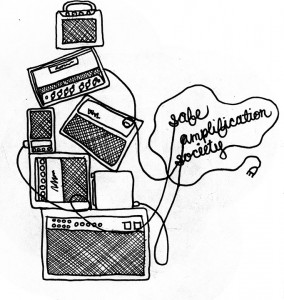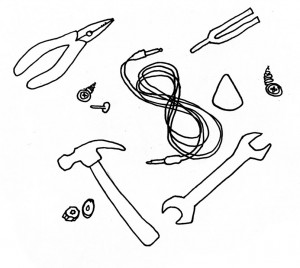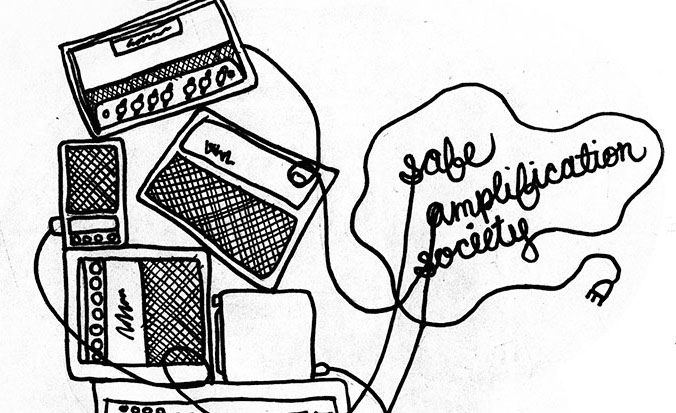Winona Forever made it to the semi-finals of last year’s Shindig battle of the bands competition. Two of their members were under 19 years old, so they had to spend both performance nights waiting in the lobby of the Patricia Hotel. They were allowed to come into the bar so that they could perform, but ushered out immediately after playing their last chords. They weren’t allowed in the room to hear the results, and they had to wait until the end of the night when the audience cleared to take their equipment home.
Vancouver is a rough cultural landscape for the underage community. To host an all-ages event, a venue has to shut down their bar. But most of the real money made at shows is through bar sales rather than door sales, which makes hosting all-ages events a tough sell for small venues. To make matters worse, a law passed in 2012 made it illegal for liquor primary establishments to shut down their bars in the evenings. Law-makers were worried that minors were binge drinking before shows. If it seems counter-intuitive to shut down dry, all-ages shows because of alcohol consumption, that’s because it is— the law effectively made safe venues like the Rickshaw Theatre inaccessible to minors, forcing them to turn to underground venues.

The Safe Amplification Society of Vancouver, or Safe Amp, began in 2009 to champion access to the music scene for people of all ages. Operating out of Astorino’s, they hosted workshops, and up to 9 shows each month until they could no longer pay the lease, and were forced to shut down. Volunteers scattered and momentum for all-ages advocacy was lost. Until two months ago —
I met with two leaders of the new wave of Safe Amp, Heidi Holland and Kat Kott to talk about the future. Holland and Kott met through UBC’s Media Studies Program and the local art community. The future of Safe Amp is bright, led by people who understand the underage community firsthand.
“I was 18 for two months in Vancouver,” Kott says, “and I was considering getting a fake.” The frustration of being excluded from the arts community because of their ages drove them to action. Of Safe Amp’s seven directors, three are 19 years-old and new to Vancouver’s music scene. “And that can be a barrier sometimes,” says Holland. “We don’t know how to do things like taxes! But at the same time, we are kind of the target demographic.” This energy is complemented by the knowledge base and relationship with the community, cultivated by the original directors.
Kott and Holland emphasize that although it’s a tempting solution, illegal venues are not enough for the underage music community. “Sometimes we’re like, ‘Wow, everything would be so much easier,’ but [Safe Amp] has always done everything above board. And that’s what makes our events inclusive.” Kott adds that it’s the legality that allows Safe Amp to advertise their events and draw in as many people as possible. Word-of-mouth venues are by nature exclusive to those who already have access to the community.

Another possible catch-22 for Safe Amp is funding. The population most invested in Safe Amp’s success does not necessarily have the resources to pay $15 for a show. The balance of keeping Safe Amp going and being as accessible as possible can be painful. Holland and Kott are quick to stress that Safe Amp sees accessibility as more than age: “We want Safe Amp to be as accessible as possible, and that includes financial accessibility.”
Another aspect of accessibility is simply increasing the amount of safe, underage events, a short-term goal of Safe Amp. Ensuring reliable monthly shows lowers barriers to entry for new members of the community. The group is also looking to revamp their workshops to teach screen printing, zine making, and more. The long-term goal of Safe Amp is the establishment of a permanent, legal, sustainable, and affordable venue.
Safe Amp’s new wave kicked off October 27 at the Russian Hall with a Halloween cover show featuring Phono Pony, Wind-Up Birds, The Jins, and Frogpile. At the time of this interview, when asked how the event has been received, Holland and Kott share excited glances. Within the first few hours that the Facebook event was created, more than 100 people confirmed attendance. “It’s amazing the support we’ve gotten since we released the event,” says Holland. “A lot of people really love Safe Amp.”
I admire Winona Forever for believing that their music was worthy of recognition despite playing in an environment that would have seemed unwelcoming. Their current success is proof that their faith was justified. But we should consider who is in the social position to cultivate this audacity. Non-native english speakers, newcomers to Vancouver’s music scene or other groups that are not traditionally reflecting the music community may be less likely to jump through hoops like these. By giving underage musicians a platform for their work, Safe Amp creates a welcoming environment for a variety of voices.
x
Safe Amplification society has a new website at safeamp.org. Check it out for upcoming shows and ongoing advocacy.


